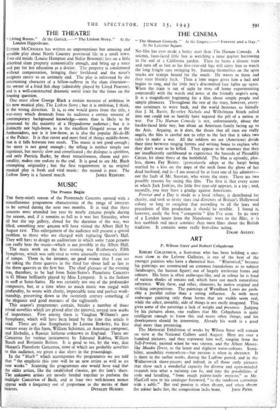THE CINEMA
No film has ever made a better start than The Human Comedy. A solemn, faun-faced little boy is watching a tame gopher burrowing in the soil of a California garden. Then he hears a distant train and runs off as fast as his five-year-old legs will carry him to watch the long freight cars swinging by. Sunning themselves on the open trucks are tramps bound for the south. He waves to them and they stare blankly back. Then a lone negro gives him a hail and begins to sing, and the little boy's discomfited face lights up again. When the train is out of sight he trots off home experimenting contentedly with the words and notes of the friendly negro's song. It is a magnificent beginning for a film about simple people and simple pleasures. Throughout the rest of the story, however, every- one continues to wave back, and the world becomes so friendly that J. M. Barrie, Beverley Nichols and Wilhelmina Stitch rolled into one could not so heavily have sugared the pill of a nation at war. For The Human Comedy is not, unfortunately, about the freckle-faced little boy, but about an American family facing up to the Axis. Arguing, as it does, the thesis that all men are really angels, the film is careful not to refer to the fact that it takes two sides to make a war. All the soldiers we see (American) divide their time between singing hymns and writing home to explain why they don't want to be killed. They appear to be unaware that they are insufficiently earthbound to experience the hazards of Piccadilly Circus, let alone those of the battlefield. The film is episodic, plot- _ less, shows Fay Bainte: (prematurely adept at the harp) being startled by a kiss on the nape of the neck from the ghost of her dead husband, and is—I am assured by at least one of his admirers— not the fault of Mr. Saroyan, who wrote the story. There are two possible reasons for seeing this film. The first is that every scene in which Jack Jenkins, the little five• year-old appears, is a joy ; and, secondly, you may have a grudge against Americans.
Forever and a Day is made as a loyal tribute, is distributed for charity, and took so many stars and directors of Britain's Hollywood colony so long to complete that according to all the laws and precedents of film production it should be terrible. I found it, however, easily the best " composite " film I've seen. In its story of. a. London house from the Napoleonic wars to the Blitz, it is less snobbish and more sensitive than most films about the British tradition. It contains some really first-class acting.
EDGAR ANSTEY.






























 Previous page
Previous page